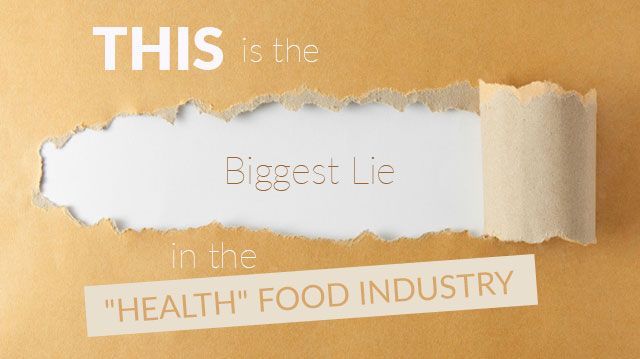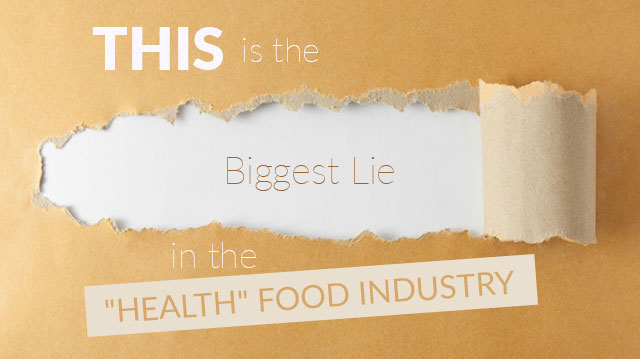
It’s a “natural” disaster. Foods labeled “100% Natural” at the grocery store are often not natural, at all. The U.S. Food and Drug Administration (FDA) themselves state, “It is difficult to define a food product that is ‘natural’ because the food has probably been processed and is no longer the product of the earth.” Yet walk into a supermarket and you will see many packaged food products: cheese, crackers, chips and cereals (to name a few) labeled “100% natural” or “all natural” when they really are not.
Many people think they are making smart, healthy purchases by adding these “all natural” items to the shopping list, when they may be unwittingly buying unhealthy foods. In fact, Consumer Reports recently surveyed 1,005 individuals and found that 70 percent of people surveyed felt they were buying healthy food when a product was labeled “100% natural.” People are being misinformed by these labels, and it is just not right.
To make good food decisions, we need to know what is in the food, and how it is processed. If something is labeled, it should have a definition that is legal and binding, and companies should be held accountable for misleading consumers.
What does a “natural” label mean today?
Foods labeled “natural” can contain genetically modified organisms (GMOs), high-fructose corn syrup, and be highly processed. Food processing includes thermal (heat) manufacturing techniques, pasteurization and irradiation. These are processes that happen at the factory when producing the food. In addition, foods labeled “natural” say nothing about the way the food was farmed. “Natural” foods can be farmed with pesticides, for example.
Commercial companies are trying to capitalize on the expanding “healthy eating” trend embraced by consumers, without doing the work to make sure their products are truly natural. The FDA has no binding guidance on the word “natural.” And with no rules, it is up to Big Food to regulate themselves on what they consider natural, which is definitely not a good thing.
So how do you eat healthy, natural foods? When do you know if a “natural” label truly reflects how a product was farmed, how it was processed, and how safe it is to eat?
Buy organic, it’s more natural
 You can buy organic: The organic label is regulated under the 2002 National Organic Program (NOP), a branch of the U.S. Department of Agriculture (USDA). USDA organic food products follow strict guidelines, rules and regulations. An organic label speaks to both the product itself and how it was produced.
You can buy organic: The organic label is regulated under the 2002 National Organic Program (NOP), a branch of the U.S. Department of Agriculture (USDA). USDA organic food products follow strict guidelines, rules and regulations. An organic label speaks to both the product itself and how it was produced.
Organic food products do not contain genetically modified organisms (GMOs), and the “USDA organic” label says something about the way the food was produced. Organic foods are made without the use of pesticides, synthetic fertilizers, sewage sludge, or ionizing radiation. Meat and diary products labeled organic offer you the assurance that the animals they came from were given no antibiotics or growth hormones. These animals are also raised using humane practices, unlike conventional farming.
Organic food products have much stricter guidelines in their processing, as well as oversight in the form of farm inspections. Organic food can still be processed, but there is a more limited list of which manufacturing processes the food can undergo.
There are more guidelines and inspections to pass. The organic system may not be perfect, but it is a huge improvement in transparency as to how the food was made and what is contained in it. It is a near opposite of the “natural” label. There are legal definitions, government oversight, and consequences to companies on labeling something organic.
Buy organic. You will have a clearer understanding of what you are getting.
It’s easy to get involved
The FDA is looking at how the public defines the word “natural.” You can comment on what you would like included in a definition of the natural label. You can also comment on whether you feel this label should be allowed at all. The consumer voice is expanding, and your voice matters.
—Nikki Walsh
Nikki Walsh is a freelance writer and mom of two kids living in Southern California. She holds an MBA in marketing from University of California, Irvine and a bachelor’s degree in Biochemistry from UCSD. She has been practicing Kelee meditation for 19 years. When she is not writing she can be found out and about having fun with her kids.
Sources:
http://www.fda.gov/Food/GuidanceRegulation/GuidanceDocumentsRegulatoryInformation/LabelingNutrition/ucm456090.htm
http://www.consumerreports.org/content/dam/cro/magazine-articles/2016/March/Consumer_Reports_Natural_Food_Labels_Survey_2015.pdf
http://www.fda.gov/ohrms/dockets/dockets/06p0094/06p-0094-cp00001-05-Tab-04-Food-Marketing-Institute-vol1.pdf
http://www.fda.gov/aboutfda/transparency/basics/ucm214869.htm
http://www.ams.usda.gov/grades-standards/organic-standards
http://www.ams.usda.gov/about-ams/programs-offices/national-organic-program

